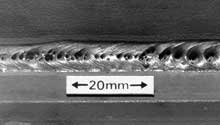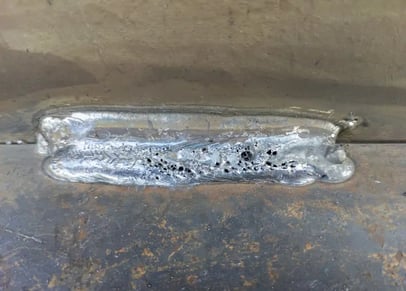Specialist Suggestions on What is Porosity in Welding and Just How to Resolve It
Specialist Suggestions on What is Porosity in Welding and Just How to Resolve It
Blog Article
The Scientific Research Behind Porosity: A Comprehensive Overview for Welders and Fabricators
Recognizing the detailed devices behind porosity in welding is critical for welders and producers striving for impressive craftsmanship. From the make-up of the base materials to the details of the welding procedure itself, a wide range of variables conspire to either exacerbate or relieve the existence of porosity.
Understanding Porosity in Welding
FIRST SENTENCE:
Evaluation of porosity in welding discloses important understandings into the stability and top quality of the weld joint. Porosity, characterized by the existence of cavities or spaces within the weld steel, is an usual issue in welding procedures. These gaps, if not properly dealt with, can endanger the architectural integrity and mechanical properties of the weld, resulting in possible failures in the completed item.

To detect and quantify porosity, non-destructive testing methods such as ultrasonic testing or X-ray evaluation are typically utilized. These methods enable the recognition of internal problems without jeopardizing the stability of the weld. By evaluating the size, shape, and circulation of porosity within a weld, welders can make enlightened choices to enhance their welding processes and attain sounder weld joints.

Factors Influencing Porosity Development
The incident of porosity in welding is affected by a myriad of elements, ranging from gas shielding efficiency to the intricacies of welding specification settings. Welding specifications, consisting of voltage, existing, travel speed, and electrode kind, also effect porosity development. The welding technique utilized, such as gas steel arc welding (GMAW) or protected steel arc welding (SMAW), can affect porosity formation due to variants in warmth distribution and gas protection - What is Porosity.
Results of Porosity on Weld High Quality
The visibility of porosity additionally deteriorates the weld's resistance to rust, as the trapped air or gases within the gaps can respond her comment is here with the surrounding atmosphere, leading to destruction over time. Furthermore, porosity can impede the click here for info weld's capability to withstand pressure or influence, more endangering the general quality and reliability of the welded framework. In essential applications such as aerospace, automobile, or architectural building and constructions, where safety and security and toughness are vital, the detrimental impacts of porosity on weld high quality can have serious effects, highlighting the importance of decreasing porosity with correct welding methods and procedures.
Methods to Minimize Porosity
In addition, making use of the appropriate welding parameters, such as the right voltage, existing, and take a trip rate, is critical in preventing porosity. Maintaining a constant arc length and angle during welding likewise helps reduce the possibility of porosity.

Furthermore, selecting the best protecting gas and preserving appropriate gas circulation prices are essential in lessening porosity. Utilizing the proper welding method, such as back-stepping or utilizing a weaving movement, can additionally help distribute warm uniformly and decrease the chances of porosity formation. Guaranteeing proper ventilation in the welding setting to eliminate any type of potential resources of contamination is crucial for attaining porosity-free welds. By applying these strategies, welders can successfully reduce porosity and produce high-quality bonded joints.

Advanced Solutions for Porosity Control
Implementing sophisticated modern technologies and cutting-edge techniques plays a crucial role in accomplishing premium control over porosity in welding processes. In addition, employing sophisticated welding strategies such as pulsed MIG welding or modified environment welding can likewise aid mitigate porosity problems.
An additional sophisticated option involves using sophisticated welding devices. Utilizing equipment with built-in functions like waveform control and sophisticated power resources can improve weld high quality and lower porosity risks. The application of automated welding systems with exact control over specifications can dramatically decrease porosity problems.
Additionally, incorporating advanced monitoring and inspection technologies such as real-time X-ray imaging or automated ultrasonic testing can aid in spotting porosity early in the welding process, allowing for immediate rehabilitative click this link activities. Generally, incorporating these sophisticated remedies can substantially boost porosity control and boost the general quality of bonded parts.
Verdict
In verdict, comprehending the scientific research behind porosity in welding is important for welders and fabricators to produce top notch welds - What is Porosity. Advanced services for porosity control can better enhance the welding procedure and make certain a strong and reputable weld.
Report this page